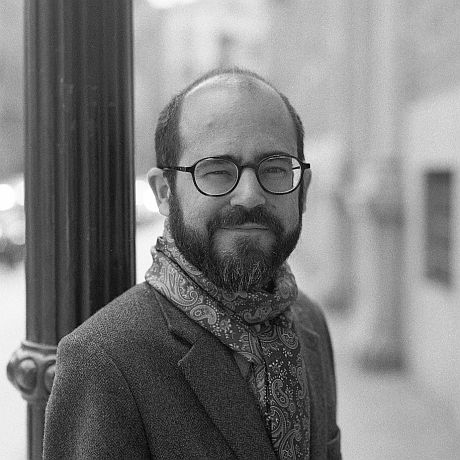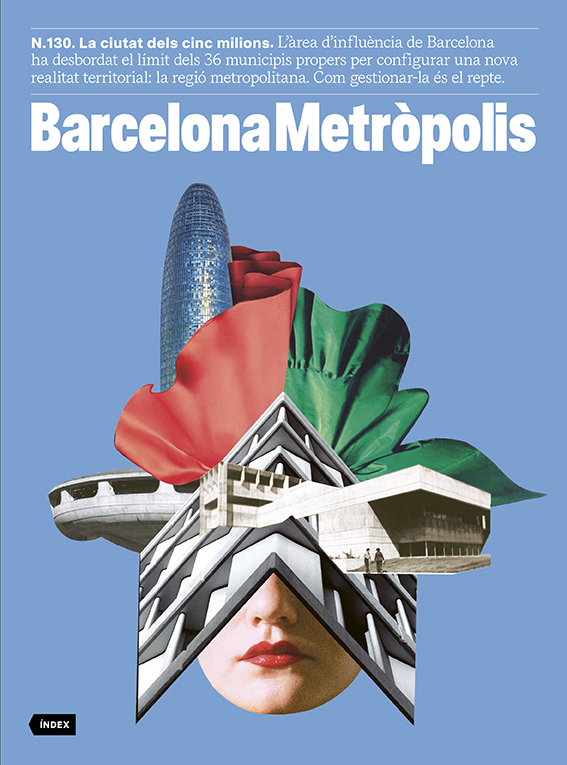The legacy of Ferran Adrià. Is Barcelona a culinary capital?
- Culture Folder
- Debate
- Apr 24
- 13 mins
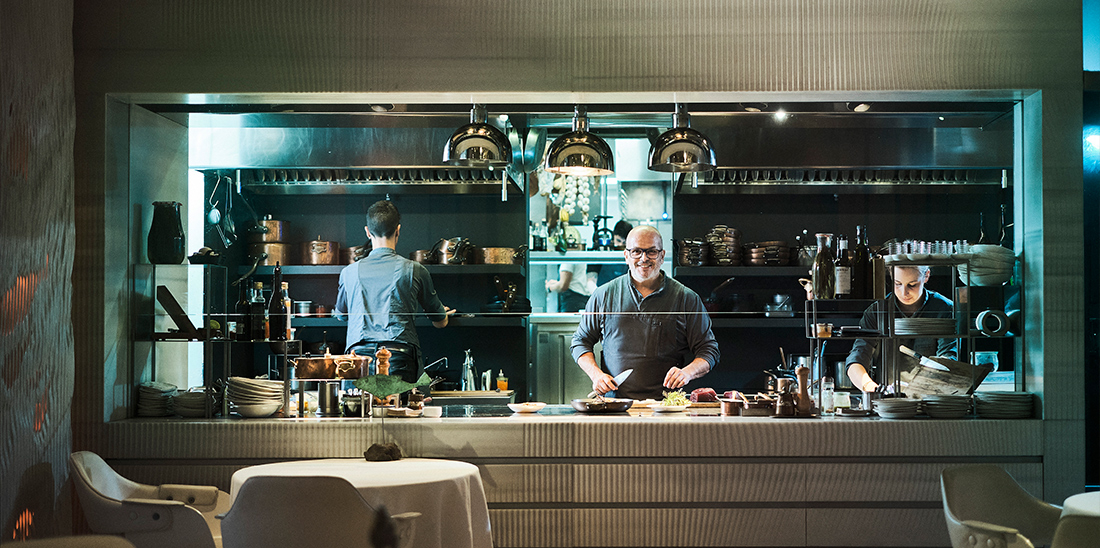
On 28 November, at a gala hosted in Barcelona, the restaurant Disfrutar, established by Eduard Xatruch, Oriol Castro and Mateu Casañas, achieved the prestigious three Michelin stars. This recognition now places the city in possession of four top-tier restaurants, as endorsed by the esteemed 2024 guide. The accolade not only celebrates the work of Ferran Adrià’s protégés but also solidifies Barcelona’s status as a gastronomic capital, dispelling any doubts.
In the 19th century, Italian and Swiss innkeepers shaped popular cuisine, while French restaurateurs imparted the fundamentals of gourmet dining to the city’s bourgeoisie. By 1936, Republican Barcelona had already reached gastronomic heights. In that fateful year’s edition of the Michelin Guide, several establishments appeared seemingly out of nowhere: Euzkadi, owned by Esteve Sala and later renamed Navarra after the war, located on the street Carrer de Casp; Catalunya, in the square of the same name alongside Carrer de Bergara, with one star; Casa Llibre, on Gran Via de les Corts Catalanes; Taberna Vasca, very close to the Ritz; and Font del Lleó, in Pedralbes, with two stars. It’s remarkable that Barcelona didn’t see any Michelin-starred restaurants again until 1974, a time when Franco’s regime was crumbling. The now-defunct Reno on Carrer de Tuset was awarded a star that year, followed by Via Veneto the year after, which has since retained its star with a commitment to craftsmanship and expertise, unaffected by passing trends. Having assimilated the expertise of luminaries like Néstor Luján, writer and gastronome Manuel Vázquez Montalbán helped dispel any reservations among the city’s more progressive circles, allowing many to indulge in fine dining without any (class-based) qualms.
Since the late 1990s, during the prime of Catalan cuisine –Sant Celoni, Girona, Sant Pol, Cala Montjoi–, Barcelona started gaining recognition as a gastronomic capital. This period coincided with a surge in tourism following the 1992 Olympic Games, forever altering the city’s image from one primarily focused on fairs and conventions. Over the past three decades, Barcelona has overhauled its culinary scene, now standing as a draw comparable to Gaudí’s architecture or the art of Picasso and Miró. Yet, the city hasn’t been immune to the pressures of globalisation: the disappearance of iconic establishments – and the dramatic loss of neighbourhood wine bars – due to generational shifts, rising living costs and real estate pressures; the proliferation of soulless establishments; and the homogenisation of culinary trends. Given these shifts, it’s worth questioning whether, despite its Michelin-starred joy, Barcelona retains its status as a gastronomic capital today.
 © Xavier Cervera
© Xavier CerveraCristina Jolonch
Journalist and director of La Vanguardia’s Comer channel
Absolutely! When it comes to haute cuisine, there’s no denying the indisputable allure. Barcelona boasts some of the world’s most creative restaurants, many of which trace their roots back to Ferran Adrià’s elBulli, which changed everthing – its successors include Disfrutar, Enigma and Dos Palillos. The sea and mountains, reflected in a highly original recipe book, have inspired the stalwarts of our culinary culture – from Carles Gaig to Jordi Vilà, the family behind 7 Portes, Fermí Puig, and many others. And if we’re talking about small, modest establishments bursting with creativity and talent, they abound everywhere.
In an era where cities unfortunately increasingly resemble one another, the Catalan capital still stands out for its distinctive gastronomic offerings. These aren’t times of grand luxury projects, which come few and far between, but rather of modest yet highly interesting initiatives that invigorate neighbourhoods. It’s a time of camaraderie among friends who share investments and ideas, regardless of the replicated offerings in the most touristy areas, where there’s an abundance of low-quality franchises to bemoan. Some have opened, taking over businesses with a long-standing history that couldn’t withstand the onslaught of the pandemic and the rising cost of living. Barcelona brings together talent, diligence, and personality. And we mustn’t forget the good daily set menus at affordable prices. They exist, but more are needed. It’s also imperative that tourists aren’t left struggling to find a good pa amb tomàquet [bread smeared with tomato and drizzled with olive oil], some fideus a la cassola [braised noodles], or a fricandó [braised beef in sauce] to dip bread in.
 © JRE magazine
© JRE magazinePere Monje
General manager of the restaurant Via Veneto
Without a doubt, Barcelona is a culinary capital with huge potential to leverage this status on a Spanish, European and global scale. What sets Barcelona apart from many cities is its wide diversity of excellent restaurants and a plethora of culinary talent: from small neighbourhood eateries helmed by innovative young chefs to haute cuisine establishments rivalling the best in the world. In this regard, Barcelona’s dining scene boasts much more competitive prices than other major cities.
What’s more, Barcelona has a network of municipal markets that is absolutely unique and distinct compared to any other city in our vicinity. The potential to promote and sustain this valuable asset within the city is immense. There is also a significant abundance of farmers, fishermen, winemakers, and, overall, an agricultural and livestock ecosystem that is far more substantial, with our city serving as the closest market for selling all their products. Strengthening this relationship between the city and its surrounding producers is crucial and serves as a distinguishing feature of Barcelona – a city characterised by its climate, character and geography, all of which encourage social interaction. It is imperative that we also nurture this aspect, reigniting the spirit of hospitality among all Barcelonians to be the best hosts for our visitors.
 © CETT
© CETTMaria Abellanet
Chair of the Barcelona School of Tourism, Hospitality and Gastronomy (CETT)
Gastronomy serves as a defining element of our society, revealing our identity and how we present ourselves to the world. When we think of Barcelona, we envision a cosmopolitan city where both land and sea take centre stage, and where cultural and culinary heritage infuse the fish market and its markets, keeping the connection between chefs and local produce alive.
Today, Barcelona has become a global benchmark in gastronomy, offering a rich, diverse and high-quality culinary scene that not only enhances the experience of our visitors but also enriches the lives of its residents.
Furthermore, Barcelona is the only Spanish city that, boasting a total of around thirty Michelin stars, is home to four three-star restaurants, elevating its status as a capital of haute cuisine on both the national and international stage.
Education has played a pivotal role in solidifying Barcelona’s position as a culinary capital. For over three decades, CETT has been training professionals in the culinary and gastronomy sectors, pioneering university-level studies in this field with a job placement rate exceeding 90%.
Responsibility and authenticity are values that are integral to our education, aimed at continuing to cultivate talent with a holistic understanding of gastronomy. Our challenge is to safeguard a culinary tradition enriched over time by generating and sharing knowledge, while fostering, in professional, academic and social realms alike, esteem for this unique gastronomic heritage with authenticity and integrity.
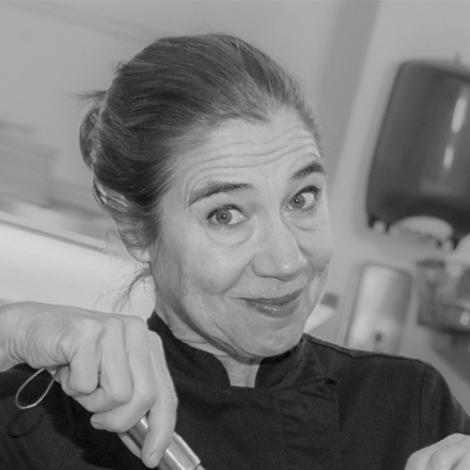
Ada Parellada
Restauranteur
Barcelona is a culinary capital. It’s not just an intuition or perception; it’s a fact backed by hard numbers. Considerable efforts have been made since the pre-Olympic era when Barcelona was almost exclusively Catalan turf. Yet, tourism, a major driver of the country’s economy, has stirred up tensions, and cuisine hasn’t escaped unscathed. We’ve sold apartments in the Eixample, we’ve sold all kinds of souvenirs, but we’ve also sold fricandó [a traditional Catalan dish]. In our quest to appear cosmopolitan, we’ve embraced sushi, tacos, pokes and mouth-watering pizzas, while relegating fideus [noodles], cannelloni and roasts to oblivion. Fortunately, traditional Catalan cuisine has been preserved in the regions, and there are still restaurants that know how to prepare escudella [a traditional Catalan stew]. However, even they haven’t been immune to the trend, with some tables playing host to both botifarra [Catalan sausage] and tataki or attempting to modernise classics like trinxat as a potato Parmentier. This pseudo-cosmopolitanism not only leads us down the path of absolute absurdity but also dims our appeal to those seeking authenticity.
Barcelona is a premier culinary capital. It must now transition into a culinary capital renowned for Catalan cuisine. Because our culinary heritage not only sets up apart but is also rooted in locally-sourced ingredients, in line with region’s climate and seasonal variations. Dietary choices are one of the main causes of climate change. Reversing this trend is urgent, and our traditional cuisine is our ally in this endeavour.
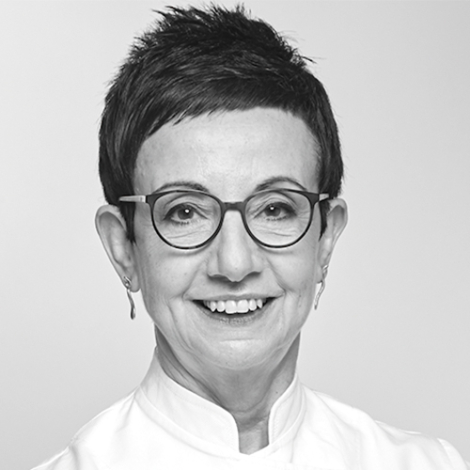
Carme Ruscalleda
Chef and culinary advocate
If we understand gastronomy as excellence in all things related to food, then Barcelona is blessed! We have inherited an immensely rich culinary culture, not only with recipes fit for grand celebrations but also embracing a natural and healthy culinary ethos – a culture marked by sustainability and ingenuity. Barcelona boasts, and proudly showcases, a network of revamped and modern municipal markets, offering a diverse array of products for a diet rooted in seasonality and local produce.
The city’s culinary scene is both rich and varied, featuring everything from signature dishes to traditional fare and international cuisine. As one of the most coveted destinations globally, Barcelona naturally hosts cuisines from all over the world, all coexisting alongside our Catalan cuisine.
Tourism serves as a vital economic driver for our city: we attract visitors from across the globe, drawn by the beauty of the metropolis, its architecture, museums, concerts, leisure and recreation activities, and also we receive travellers who visit us for the city’s gastronomy.
I believe we can assert that Barcelona is a gastronomic and eclectic city with impeccable century-old establishments, restaurants gracing the world’s top lists, major hotels that prioritise gastronomic experiences, inns and eateries, and small kitchens offering truly unique cuisines. It is up to us to support the establishments that showcase culinary talent and uphold gastronomic excellence.
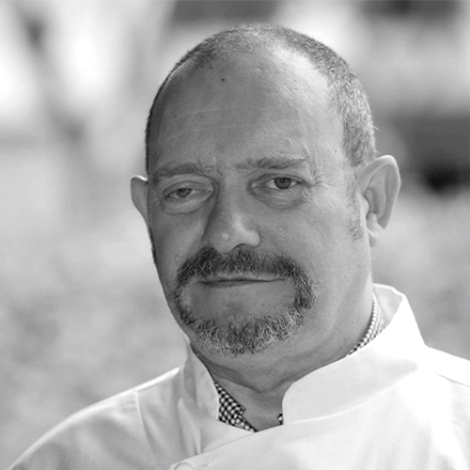
Philippe Regol
Food critic
The fact that Barcelona boasts 26 Michelin stars, including four establishments with three stars – méritent le voyage – should be seen as a sign, though not an absolute statement, that this city more than deserves recognition as a culinary capital, both within Europe and potentially worldwide.
Within Spain, Barcelona has long since wrested the title from San Sebastián, which held it for twenty years from the 1980s. This demonstrates that while the Michelin factor is undoubtedly significant, it’s not the sole measure of the city’s global gastronomic appeal, as the Basque city continues to boast three three-starred restaurants.
Our city has never quite captured the charm of the tapas culture in San Sebastián’s old quarter. Instead, in the 2000s, Barcelona embraced a burgeoning bistronomic movement, paralleling the rise of haute cuisine. This movement, inspired by the Parisian phenomenon coined by gastronome Sébastien Demorand, found its best representatives in establishments like Gresca, Coure and Hisop renowned for their top-quality ingredients, impeccable technique and, above all, undeniable gustatory delight, all within a comfortably casual setting – quite the oxymoron – and with prices more moderate than those of an upscale taverna.
Above all, it’s undeniable that the opening of Disfrutar a decade ago, followed by Enigma, has been pivotal. This has only served to cement Barcelona’s unquestionable status as a culinary capital and bolster its enticing gastronomic scene. In essence, the city directly benefits from the culinary legacy that elBulli disseminated to the world for over twenty years from the small and secluded cove of Montjoi.

Paula Carreras
Journalist. Producer of the podcast Plaersdemavida
When I think of the concept of a “culinary capital”, I picture a city with a distinct and unique personality, where most of the establishments I encounter reflect the local way of life. Naturally, that means disregarding anything that contributes to gentrification, all the businesses that are mere replicas of the one next door, and menus that are already in English from the get-go.
In Barcelona, it has become easier to find a latte than a simple cafè amb llet, a muffin before a traditional Spanish magdalena, or a focaccia before a delicious coca de recapte [flatbread topped with vegetables]. Thankfully, there are still unique spaces where individuals, beyond seeking profit, are eager to share the joy of savouring every bite. I have always believed that cooking for someone can be an expression of love and a means of fostering community, but now, it has also become a form of activism.
In Barcelona, there are still establishments where cooking is done slowly over a low flame, restaurants and bars with character and ambition that defy global trends. While clone restaurants and bars may be the convenient choice due to their proximity and abundance, it’s worth appreciating the extra effort it takes to seek out places that truly stand out. It’s up to us, the residents of Barcelona, to recognise these gems and visit them with conviction. We boast one of the finest gastronomies on the planet and a wealth of people who meticulously hone their craft. If the task of making Barcelona a gastronomic capital rests with us, let’s make it happen.
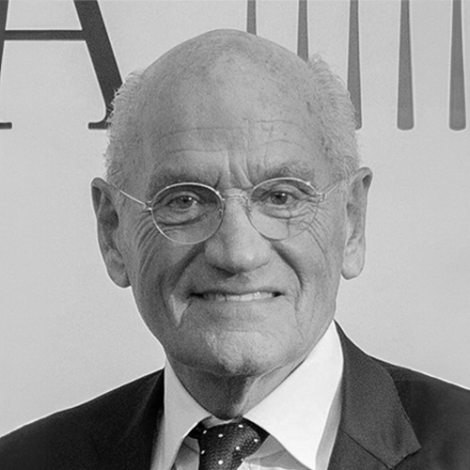
Carles Vilarrubí
President of the Acadèmia Catalana de Gastronomia i Nutrició [Catalan Academy of Gastronomy and Nutrition]
I understand that this isn’t the sole indicator of Barcelona being a culinary capital, but consulting the internationally renowned Michelin Guide, the evidence is clear: the city boasts four restaurants each awarded three Michelin stars, firmly establishing it as a leader among gastronomic cities in Spain and Europe.
The renowned school of elBulli and other haute cuisine restaurants has paved the way for a vibrant and talented gastronomic scene today. If we harbour any doubts, they likely stem from factors beyond the culinary realm, urging us to reaffirm our stance on this matter. When prompted to reflect on areas for improvement, amid our pursuit of excellence, one aspect deserving attention is the realm of service. It would be beneficial for professionals to also aspire to excel in dining room management and service.
At the Acadèmia Catalana de Gastronomia i Nutrició, we focus on four areas to uphold our exceptional gastronomic standards: fostering professional training in restaurant service, promoting awareness of Catalan wines and their producers, also within the hospitality industry, recognising and honouring the primary sector – such as farmers, livestock breeders and fishermen – and integrating nutrition into gastronomy to combat the childhood obesity epidemic. Through these four areas, we can consolidate Barcelona’s position as a culinary capital, a title we firmly hold.

Jordi Vilà
Chef of the restaurants Alkimia and Al Kostat and owner of several dining establishments.
Barcelona is as one of the world’s great culinary capitals, if not the foremost. And I’m not just saying that. By simply examining it, anyone inclined can compile a list and compare the findings with those of Barcelona. In Europe, Barcelona rivals Paris, while on the global stage, it competes with Tokyo. Arguably, gastronomically speaking, Barcelona is the most vibrant city in the Western world.
When we refer to Barcelona as a culinary capital, it’s not about fleeting consumption trends, but rather about the presence of chefs with enduring careers and impressive credentials that define it as such. In this regard, the number of new projects pales in comparison to the significance of talented chefs. For instance, without drawing comparisons to Madrid, Italy is a gastronomic powerhouse, yet its cities aren’t recognised as culinary capitals.
Barcelona is no accident. It hasn’t emerged in the middle of the desert like Las Vegas. It’s nestled in the Mediterranean, a space of exchange for ideas and products, cultures, trends, flavours… All of this has turned it into a hub of creativity, in art, fashion, architecture, entertainment, and more. Despite what might be said about its challenging times, creativity is woven into its very fabric. In this regard, we cannot overlook that elBulli’s culinary school has been the most revolutionary force in gastronomy over the past thirty years, leaving its deepest imprint in Barcelona.
Barcelona is the capital of Catalonia, where within a small area, you go from mountains nearly 3,000 meters high to a lengthy coastline. Historically, as a nation, we’ve had to rely on our own resourcefulness, which has turned us into traders and sceptics, with a penchant for fatalism. Perhaps that’s why we struggle to fully believe in ourselves.
The newsletter
Subscribe to our newsletter to keep up to date with Barcelona Metròpolis' new developments



